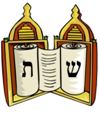
ק׳ ק׳ שׁערי תפילה

*****
תזכו לשנים רבות
May the upcoming year bring the kahal
good health, beracha and hatzlacha
****

is Thursday night Friday & Shabbat
********
💳
💷 Pledge Reminder 💷
If you received an Aliya during the Yamim Noraim or over Succot
and pledged any money or would like to make a donation
the donation can be fulfilled in any of the following ways:
· By post addressed to
'The Treasurer, Manchester Congregation of Spanish and Portuguese Jews,
18 Moor Lane, Salford, Manchester M7 3WX'.
· By hand to the treasurer or any member of the Mahamad.
·Anonymously in the donations box in the Synagogue.
·Direct Debit to the shul's account
for account details please speak to the treasurer
·Cheque
Cheques should be made payable to
'Manchester Congregation of Spanish & Portuguese Jews'.
Thank you all for your very generous donations
& Tizke Lemitzvot
****

Winter Season begins
NEXT WEEK
stayed tuned for details
****
🗓️
לוח זמני תפלה לחורף
תשפ״ה
Winter Timetable 5785 – 2024/25
מוצאי שבת | ערבית | שקיעה | מנחה שבת | סוף זמן קריאת שמע | הדלקת נרות | מנחה וקבלת שבת | תאריך | שבת פרשת |
Shabbat Ends | Arbit | Sunset | Minha | Shema before | Candle Lighting | Minha & Kabbalat Shabbat | Date | Parasha |
PM | PM | PM | PM | AM | PM | PM |
|
|
5:25 | 5:21 | 4:32 | 3:55 | 9:31 | 4:20 | 4:20 | 1/2 Nov | נח (ר״ח) |
🕯️NEW WINTER TIMES FOR SHABBAT🕯️
שבת
קרבנות
8:45 am
הודו
9:00 am
📎 Winter timetable attached to this email
*******

It is now ten generations since the creation of the first man. Adam's descendants have corrupted the world with immorality, idolatry and robbery, and Hashem resolves to bring a flood which will destroy all the earth's inhabitants except for the righteous Noach, his family and sufficient animals to re-populate the world. Hashem instructs Noach to build an ark in which to escape the flood. After forty days and nights, the flood covers the entire earth, including the tops of the highest mountains. After 150 days the water begins to recede. On the 17th day of the 7th month, this ark comes to rest on Mount Ararat. Noach sends forth a raven and then a dove to ascertain if the waters have abated. The dove returns. A week later, Noach again sends the dove, which returns the same evening with an olive leaf in its beak. After seven more days, Noach once again sends forth the dove, which this time does not return. Hashem tells Noach and his family to leave the ark. Noach brings offerings to Hashem from the animals which were carried in the ark for this purpose. Hashem vows never again to flood the entire world and gives the rainbow as a sign of this covenant.
Noach and his descendants are now permitted to eat meat, unlike Adam. Hashem commands the Seven Universal Laws: The prohibitions against idolatry, adultery, theft, blasphemy, murder and eating the meat of a living animal, and the obligation to set up a legal system. The world's climate is established as we know it today.
Noach plants a vineyard and becomes intoxicated from its produce. Ham, one of Noach's sons, delights in seeing his father drunk and uncovered. Shem and Yefet, however, manage to cover their father without looking at his nakedness, by walking backwards. For this incident, Canaan is cursed to be a slave. The Torah lists the offspring of Noach's three sons from whom the seventy nations of the world are descended.
The Torah records the incident of the Tower of Bavel, which results in Hashem fragmenting communication into many languages and the dispersal of the nations throughout the world. The Torah portion concludes with the genealogy from Noach to Avram.
Ohr Somayach Institutions www.ohr.edu

הקדמה להלכות כבוד אב ואם
תנו רבנן (שנו חכמים): שלשה שותפין באדם, הקדוש ברוך הוא, ואביו ואמו, ופירוש הדברים, שביצירת האדם שותפים האב והאם, והקדוש ברוך הוא נופח בו נשמה. ועוד אמרו רבותינו, בזמן שאדם מכבד את אביו ואת אמו, אומר הקדוש ברוך הוא, מעלה אני עליכם כאילו דרתי ביניכם וכבדתם אותי.
ועוד סיפרו שם בגמרא על דמא בן נתינה, שפעם אחת היה לבוש בגדי זהב מאותם של נכבדי רומי, והיה יושב בין גדולי רומי, ובאה אמו וקרעה ממנו את אותו הבגד, וטפחה על ראשו וירקה בפניו, והוא לא הכלימה.
ועוד הביאו שם (דף לא:) מעשה ברבי טרפון, שבכל פעם שהייתה אמו יורדת ועולה למיטתה (שהייתה גבוהה מן הארץ) היה כורע כדי שתוכל אמו לרדת על גבו (דהיינו שהיה משמש לה כ”דרגש” לעלות ולרדת ממיטתה.) ועוד הובאו שם בגמרא כמה מעשים בגודל מצות כבוד אב ואם ועד היכן הדברים מגיעים. ומרן רבינו יוסף קארו, בשולחן ערוך (יו”ד ס”י רמ) פתח את הלכות כבוד אב ואם “צריך ליזהר מאד בכבוד אביו ואמו ובמוראם”, כי מצוה זו היא יקרה מאד, ובנקל יכול אדם להיכשל בה, ועל כן החובה מוטלת על כל אדם להיזהר הרבה במצוה זו לקיימה כהלכתה, ובימים הקרובים יובאו ברצות ה' עיקרי דיני כבוד אב ואם, ממה שביארנו לפני כמה שנים, ובסדר נכון בעזרת ה'
Introduction to the Laws of Honoring One’s Parents
Honor Your Father and Your Mother
The Baraita (Kiddushin 30b) states: “One verse states, ‘Honor your father and your mother,’ while another verse states, ‘Honor Hashem with your wealth.’ We see that that the Torah equates honoring one’s parents to honoring Hashem. One verse states, ‘Each man shall revere his mother and father,’ while another verse states, ‘You shall fear Hashem, your G-d.’ we see that the Torah equates revering one’s parents to revering Hashem.”
The Baraita further states that there are three partners in the formation of man: Hashem, one’s father, and one’s mother. The parents provide the physical body while Hashem infuses it with a soul. Furthermore, our Sages taught that when honors one’s parents, Hashem says, “I consider it as though I have dwelled among you, and you have honored Me.”
Honor of One’s Father vs. Honor of One’s Mother
The Baraita states: “Rabbi (Yehuda Ha’Nassi) said: It is revealed before the Master of the Universe that one honors one’s mother more than one’s father. It is for this reason that the Torah preempted the honor of one’s father before the honor of one’s mother. It is also revealed before the Master of the Universe that one reveres one’s father more than one’s mother. It is for this reason that the Torah preempted the reverence of one’s mother before one’s father.
The Extent to Which One Must Honor One’s Parents
The Sages asked Rabbi Eliezer how far one must go to honor one’s parents. He told them, “Go see how a gentile from Ashkelon named Dama ben Netina honored his father. Once, the Sages required a stone for the priestly apron whose value was six-hundred thousand gold coins and the key to the safe rested under the head of Dama’s sleeping father. In order not to inconvenience his father, Dama did not wake him. The next year, Hashem repaid Dama with a Red Heifer born in his flock which the Sages purchased from him for the same amount they originally wished to purchase the stone which he had forgone because of his father’s honor.”
The Gemara proceeds to recount that once, Dama ben Netina was dressed in golden robes designated for Roman nobility and his mother showed up, tore the garment, hit him on the head, and spat in his face and yet, Dama did not shame her.
The Gemara (ibid 31b) proceeds to quote an incident regarding Rabbi Tarfon’s mother that every time she needed to get in and out of her bed (which was quite high), Rabbi Tarfon would get down on all fours so that his mother could use his back a step-stool. The Gemara quotes several other incidents which teach us the extent to which one must honor one’s parents. Maran Ha’Shulchan Aruch (Yoreh De’ah, Chapter 240) introduces this topic, as follows: “One must be exceedingly careful with honoring and revering one’s parents.” This Mitzvah is extremely precious, and one can easily falter in it, and one must therefore take utmost care to observe this Mitzvah properly. Throughout the coming days, we shall, G-d-willing, discuss the primary laws of this Mitzvah based on what we have discussed in the past with some new insights as well.